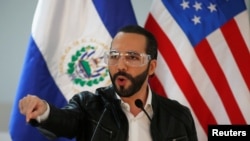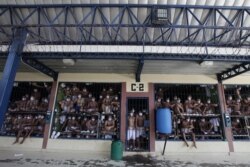El Salvador President Nayib Bukele vehemently denied allegations of collusion Friday after a report circulated by the online media outlet El Faro said his government had been engaging in talks with one of the country's most prolific gangs.
El Faro reported Friday that it had obtained a cache of government documents, including prison logs and prison intelligence reports, that show government officials engaging in talks with members of the MS-13 gang since last June.
The report alleges Bukele’s involvement with the gang stems from an effort to lower the country’s notoriously high murder rate and boost support for his campaign before the midterm elections in exchange for privileges in prison.
Attorney General Raúl Melara, whose office is independent of the Bukele presidency, said in an interview with a local television station that his office would be investigating the claims.
The 39-year-old former businessman won the race for the presidency in 2019, despite not being from either of the country’s historically dominant parties, after campaigning as a law-and-order candidate. He quickly earned recognition for the steady decline of El Salvador’s murder rate.
El Salvador’s homicide rate has declined steadily from 104 per 100,000 inhabitants in 2015 to 36 per 100,000 in 2019. The 2019 rate is still seven times the rate of the United States, according to U.S. State Department data.
Bukele took to Twitter to proclaim his innocence and target his critics, who he said “invented a novel” with the story after exhausting other attacks against him. As a means of disputing the allegations of collaboration with the gangs, Bukele cited criticisms that his administration was a dictatorship that has committed human rights violations against gangs in the region.
“The Salvadoran people are happy that after a civil war and 30 more years of crime, they can live in a much safer country than before,” he tweeted Friday. Bukele says his critics are just changing the narrative. “Now, the government is not bad with the terrorists, but good.”
The allegations against Bukele’s administration are not the first time Salvadoran officials have been accused of engaging with the country's gangs. Former President Mauricio Funes was granted asylum in Nicaragua in 2016 after facing similar accusations. Funes has denied he negotiated with MS-13.
On Friday, Melara said on a local news show, “There are politicians and ex-politicians prosecuted for negotiations with the gangs. Rumors have arisen that this situation is happening again, and we are going to investigate. No one can take advantage of the institutionality to negotiate with terrorists.”






